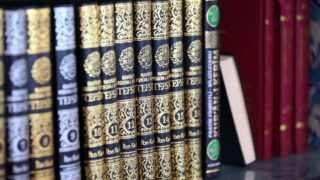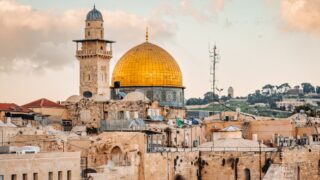The Battle of Badr is a defining moment in Islamic history, and it serves as a testament to the piety and bravery of the Sahabah, the companions of the Prophet Muhammad (peace be upon him). This historic battle, fought in the second year of the Islamic calendar, was a turning point for the Muslim community, and it laid the foundation for the growth of Islam. The Quran and the Hadith provide us with valuable insights into the significance of this battle and the role played by the Sahabah in it.
The Battle of Badr was fought between the Muslim community, led by the Prophet Muhammad (peace be upon him), and the Quraish tribe, who were the dominant tribe in Mecca. The Muslims were outnumbered and outmatched in terms of resources, but their faith and courage carried them through the battle. Allah says in the Quran: “Remember when you prayed to your Lord for help, and He answered you, ‘I will assist you with a thousand angels coming in succession.’” (Quran 8:9) This verse highlights the significance of faith and trust in Allah in times of adversity. The Muslims knew that they were facing a formidable enemy, but they put their faith in Allah and sought His help. Allah, in turn, responded to their prayers and provided them with divine assistance in the form of angels.
The Sahabah who fought in the Battle of Badr were exemplars of piety and bravery. They were motivated by their love for Allah and their desire to establish His religion on earth. Allah says in the Quran: “Those who believed and migrated and struggled in the cause of Allah with their wealth and their lives are greater in rank in the sight of Allah, and it is they who shall triumph.” (Quran 9:20) This verse highlights the importance of struggle and sacrifice in the cause of Allah. The Sahabah were willing to risk their lives and sacrifice their wealth for the sake of Allah, and they were rewarded for their efforts.
One of the most inspiring examples of the piety and bravery of the Sahabah in the Battle of Badr is the story of Abu Bakr. Abu Bakr was one of the closest companions of the Prophet Muhammad (peace be upon him), and he was known for his unwavering faith and devotion to Allah. In the Battle of Badr, Abu Bakr showed the extreme level of devotion and courage, firstly devoting all his goods and wealth in the fundraising for battle. Moreover when he saw the Quraish approaching the Muslim camp, he asked the Prophet Muhammad (peace be upon him) if he could take up arms and fight. The Prophet Muhammad (peace be upon him) replied, “You are my companion in the cave, and my companion in this battle.” This statement highlights the close bond between the Prophet Muhammad (peace be upon him) and his Sahabah, and the depth of their commitment to the cause of Islam.
Other inspiring example of the piety and bravery of the Sahabah in the Battle of Badr is the story of Umar ibn Al-Khattab. Umar was a fierce warrior, and he played a crucial role in the battle. However, his piety and humility were equally remarkable. When the Prophet Muhammad (peace be upon him) asked the Sahabah to suggest a leader for the army, Umar suggested that the Prophet Muhammad (peace be upon him) himself should take on that role. This statement reflects Umar’s humility and his recognition of the Prophet Muhammad’s superior leadership qualities.
Another striking example of courage and bravery in the Battle of Badr is that of the companion Sa’d ibn Mu’adh. He was a leader of the Ansar, the Muslims of Medina who had welcomed and supported the Prophet and his followers when they migrated there from Mecca. Sa’d was wounded in the battle, and his condition was grave. As he lay dying, the Prophet Muhammad (peace be upon him) visited him and comforted him, saying: “The throne of the Most Merciful shook for him, and the angels of heaven sought forgiveness for him.” (Sunan Ibn Majah) This shows that even in the midst of battle, the companions of the Prophet remained mindful of the mercy and forgiveness of Allah and sought to please Him above all else.
Other example is that of Abu Dujana, who was known for his physical strength and courage. He was a close companion of the Prophet and was present at many of the major battles of early Islam. In the Battle of Badr, Abu Dujana fought with great ferocity and was eventually martyred. The Prophet Muhammad (peace be upon him) said of him: “The angels are shading him with their wings and lowering him gently into the Garden.” (Al-Tirmidhi) This shows that even in death, the companions of the Prophet were rewarded for their piety and bravery.
The Battle of Badr serves as a reminder to Muslims of the importance of faith, trust in Allah, and sacrifice in the cause of Islam. The victory at Badr was not only a military triumph but also a spiritual one, as it demonstrated the power of faith and the reward that comes with it. The Quran says: “Allah has promised those who believe and do righteous deeds that for them is forgiveness and great reward.” (Quran 5:9) This promise of forgiveness and great reward is a source of motivation and inspiration for Muslims, and it encourages them to strive for excellence in all aspects of their lives.
The Battle of Badr also highlights the importance of leadership in Islam. The Prophet Muhammad (peace be upon him) was not only a spiritual leader but also a military leader, and he inspired the Sahabah to fight for the cause of Islam. His leadership qualities, including his humility, compassion, and strategic thinking, were instrumental in the victory at Badr. The Quran says: “Indeed, there has been an excellent example for you in Ibrahim and those with him, when they said to their people, ‘Indeed, we are disassociated from you and from whatever you worship other than Allah. We have denied you, and there has appeared between us and you animosity and hatred forever until you believe in Allah alone.’” (Quran 60:4) This verse highlights the importance of standing up for one’s beliefs and being firm in the face of opposition. The Sahabah in the Battle of Badr were willing to risk their lives for the sake of Allah, and they did not waver in the face of the Quraish’s superior numbers and resources.
In a nutshell, the Battle of Badr is a significant event in Islamic history, and it serves as a testament to the piety and bravery of the Sahabah. Their faith, trust in Allah, and willingness to sacrifice for the cause of Islam were the keys to their victory at Badr. The Quran and the Hadith provide us with valuable insights into the significance of this battle and the role played by the Sahabah in it. As Muslims, we can draw inspiration and motivation from their example and strive to emulate their piety and courage in our own lives. May Allah bless the Sahabah and grant them the highest ranks in paradise.
By Obaidul Hoque

















